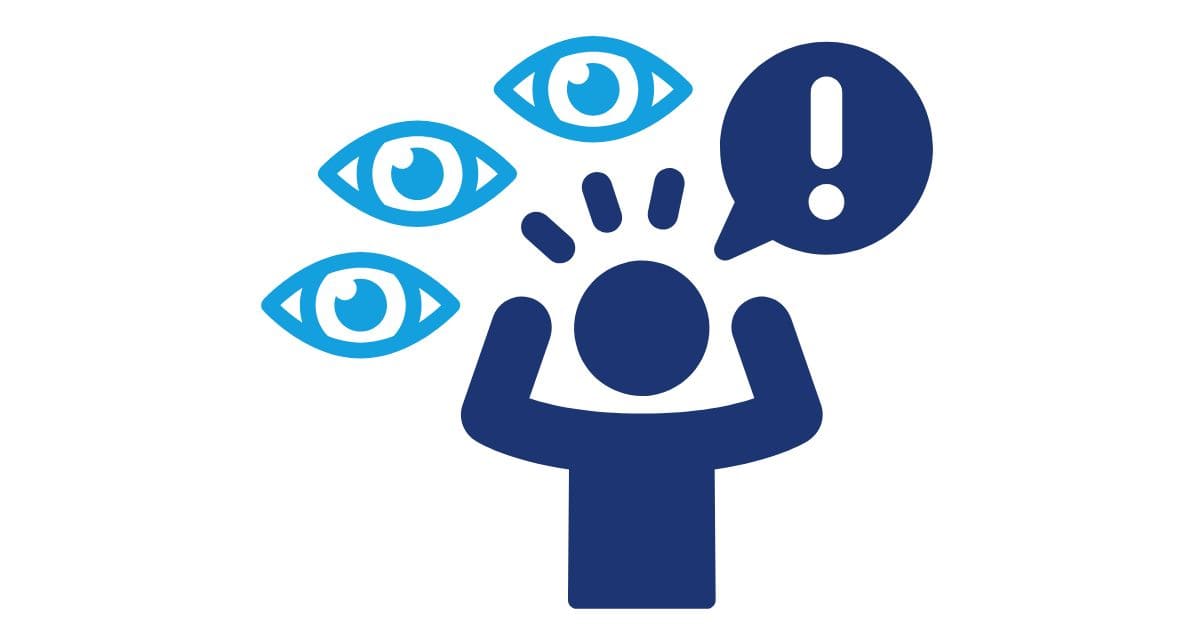MMH Men’s Mental Health does not provide direct mental health support. We do not offer crisis intervention, therapy, counselling, or medical advice. Instead, we provide information and signposting to external services that may be able to help.

Paranoia
Not sure where to turn? Support is available—take the first step.
Need to talk?
Samaritans are here to listen, 24/7, 365 days a year. You can call them for free on 116 123 or visit www.samaritans.org
Prefer to Text?
Shout is a free, confidential, 24/7 text messaging support service for anyone who is struggling to cope.
If you feel in danger please call 999 or go directly to emergency services.
It Always Feels Like… Somebody’s Watching Me
Understanding Paranoia and How to Manage It
Paranoia is characterized by irrational distrust or suspicion of others. It can severely impact daily life, especially for men, who may feel pressure to hide their fears and concerns.
📌 This guide explores what paranoia is, its causes, symptoms, and different types, while offering actionable steps to help manage it effectively.
If persistent fears and suspicions are affecting your well-being, recognizing the signs of paranoia and understanding its triggers can be the first step toward seeking the right support.
What is Paranoia?
Paranoia involves persistent thoughts and feelings that others are trying to harm, deceive, or conspire against you. These fears are often exaggerated or completely unfounded, but they can feel very real to the person experiencing them.
✅ Paranoia can range from:
✔ Mild suspicion – Feeling uneasy around others without clear evidence.
✔ Severe delusions – Firmly believing in a conspiracy against you despite contrary proof.
📌 Paranoia can be a symptom of mental health disorders such as paranoid personality disorder, schizophrenia, and delusional disorder.
What Causes Paranoia?
The exact causes of paranoia are not fully understood, but several factors may contribute to its development:
🔹 Genetics – A family history of mental health issues can increase vulnerability to paranoid thinking.
🔹 Stress – High levels of stress or anxiety can trigger paranoid thoughts, especially in those already predisposed to them.
🔹 Trauma – Experiencing abuse, neglect, or emotional betrayal can lead to paranoia as a defense mechanism.
🔹 Substance Use – Drugs like cannabis, cocaine, or amphetamines can induce paranoia, particularly when used excessively.
🔹 Mental Health Conditions – Paranoia is a symptom of conditions such as schizophrenia, delusional disorder, or paranoid personality disorder.
📌 Understanding what triggers paranoia can help in developing strategies to manage and reduce its impact.
What are the Symptoms of Paranoia?
Paranoia can manifest in various ways, but common symptoms include:
✅ Suspicion of Others – A persistent belief that people are plotting against you, even without evidence.
✅ Distrust – Difficulty trusting friends, family, or coworkers, often leading to isolation.
✅ Misinterpreting Events – Seeing hidden meanings or malicious intent in neutral situations.
✅ Hypervigilance – Constantly being on guard or feeling like you’re being watched.
✅ Defensiveness – Reacting aggressively or irrationally to perceived criticism.
✅ Reluctance to Confide – Avoiding sharing thoughts or feelings due to fear that others will use the information against you.
📌 If these symptoms persist and interfere with daily life, professional support may help in managing paranoia more effectively.
What are the Types of Paranoia?
Paranoia can take different forms depending on the underlying condition:
🟡 Paranoid Personality Disorder (PPD) – Chronic distrust and suspicion of others, often beginning in early adulthood.
🟡 Delusional Disorder – A person firmly believes in a false scenario, such as being persecuted or conspired against.
🟡 Paranoid Schizophrenia – A subtype of schizophrenia where paranoia is a dominant symptom, often accompanied by hallucinations and delusions.
🟡 Drug-Induced Paranoia – Caused by substance use, particularly stimulant drugs like cocaine or methamphetamine. Symptoms typically subside once the drug leaves the body.
🟡 Paranoia in Dementia – People with Alzheimer’s or other forms of dementia may develop paranoid thoughts as their cognitive abilities decline.
📌 Understanding the type of paranoia someone is experiencing can help in choosing the best approach for management and support.
🚨 If paranoia is affecting your relationships, work, or daily life, it’s important to seek support. Talking to a mental health professional can help you identify the causes, manage symptoms, and regain a sense of control over your thoughts.
📌 Paranoia can feel overwhelming, but you don’t have to face it alone—help is available.
Explore More
Paranoia
- Mind offers mental health support, including resources on paranoia and related conditions. They provide practical advice on dealing with paranoia and finding local help.
- Rethink Mental Illness provides comprehensive information on paranoia, its causes, and treatment options. They also offer peer support networks.
- NHS Mental Health Services offers advice on paranoia, including treatment options like talking therapies and medication. You can also find links to local mental health services.
- SANE is a UK mental health charity that supports individuals with complex mental health issues, including paranoia. They offer online forums and a helpline for advice and support.
- Turning Point provides support for people dealing with mental health and substance abuse issues. They offer specialized services for paranoia and related conditions.
While we aim to provide accurate and updated information, MMH Men’s Mental Health is not responsible for the quality, accuracy, or availability of external services linked on this page. If you notice a broken link or have a resource to suggest, let us know.
Taking Control: Steps to Help You Cope
Even small improvements can make a big impact on your well-being. Try these ideas.
If your struggles persist or affect your daily life, consulting a professional is recommended.
Talk to a Mental Health Professional
A trained therapist can help you understand the root of your paranoia and provide strategies to cope. Cognitive-behavioral therapy (CBT) is particularly effective in addressing paranoid thoughts.
Keep a Journal
Writing down your thoughts can help you differentiate between rational concerns and irrational paranoid beliefs. This process encourages self-awareness and reflection.
Challenge Your Thoughts
Maintain Healthy Relationships
Isolation can exacerbate paranoia. Try to stay connected to friends and family who are supportive and nonjudgmental.
Avoid Drugs and Alcohol
Substances can worsen paranoia, especially stimulants and hallucinogens. Staying substance-free can help stabilize your mental health.
Your Mental Health Matters.
Reaching out is a sign of strength, not weakness.
Take the next step:
Need to talk?
Samaritans are here to listen, 24/7. You can call them for free on 116 123 or visit www.samaritans.org
Prefer texting?
Shout offers free, 24/7 confidential support. Text ‘SHOUT’ to 85258 to start a conversation or visit
www.giveusashout.org
Explore More
Looking for guidance? Browse external resources on mental health, self-care, and well-being.
Support Groups
Find connection. Join an external support group and connect with others who understand.
